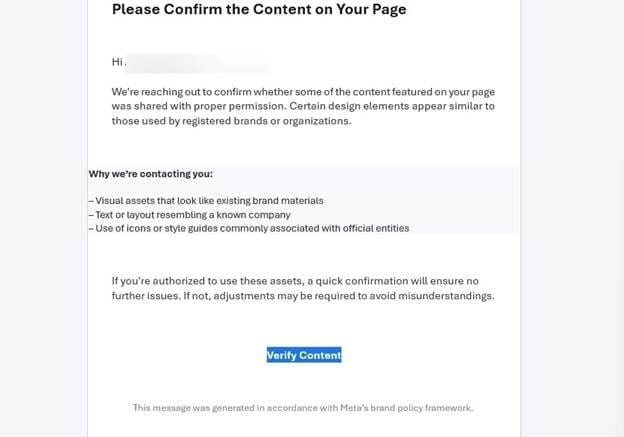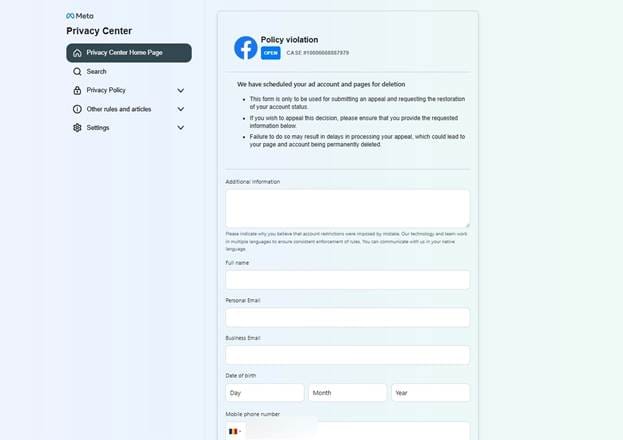Facebook Business Page Phishing Scam Targets Small Businesses with Convincing ‘Policy Violation’ Emails

A new phishing campaign is targeting small business owners on Facebook with fraudulent emails that look like official communications from Meta, warning of supposed violations of branding or advertising policies. While the emails appear credible, they're part of an elaborate scam designed to steal personal information and eventually hijack Facebook Business accounts.
According to Bitdefender Antispam Lab researcher Viorel Zavoiu, this attack has already reached victims across countries including the US, UK, Ireland, Germany, France, Italy, Japan, Australia, Romania, Canada, and elsewhere.
But what makes this campaign particularly dangerous? It doesn’t ask for login credentials right away—that’s why so many recipients may fall for it.
How the Scam Works
Small business owners receive emails with subject lines such as:
- “Please verify whether the name and branding elements displayed meet our current ad policy requirements.”
- “Confirm that your business name and profile visuals are officially approved or licensed.”
- “Your Page’s Visual Language Is Under Formal Review.”
A sample email can be seen below:

These emails use official-sounding language and Meta-style formatting to create a false sense of urgency and legitimacy. The message claims your Facebook page or ad account has been flagged for violating brand guidelines and urges you to click a “Verify Content” button.
That button leads to a cloned version of Meta’s Privacy Center, complete with logos, legal disclaimers, and a form titled "Policy Violation Confirmation."
The form warns:
"Failure to do so may result in delays in processing your appeal, which could lead to your page and account being permanently deleted.”

This is a classic pressure tactic designed to prompt action without reflection—especially alarming for small businesses that rely on Facebook for visibility, advertising, and customer communication.
What They're Really After
Unlike typical phishing scams that immediately ask for your Facebook password, this scam plays the long game.
The form asks for:
- Full name
- Personal email
- Business email
- Phone number
- Date of birth
To an unsuspecting user, this may seem like a harmless step in identity confirmation. But once scammers have this data, they can:
- Impersonate Meta representatives, following up via email or phone
- Trick you into revealing login credentials in a later step
- Use account recovery tools to hijack your business page
- Run fraudulent ads using your ad account
- Leverage your identity in other scams, including financial fraud and spear phishing
These Scams Aren’t New — Just Smarter
This isn’t the first time cybercriminals have impersonated Meta in this format. But in recent years, these scams have become more sophisticated and harder to detect. Here’s why:
- They now use refined grammar and professional formatting
- Messages include personalized links tied to your region or business page
- Fake login pages are styled like real Meta dashboards
- Most notably, they don’t request your password immediately, giving users a false sense of safety
This staggered approach makes it easier for scammers to build trust and manipulate users into deeper compromise—especially those unfamiliar with modern phishing tactics.
Why Small Businesses Are Prime Targets
Small businesses often lack dedicated security teams or awareness training. They may rely on a single admin to manage their social presence—making them ideal targets for phishing campaigns like this.
If scammers gain access to a business page, the consequences can be severe:
- Permanent loss of the page or advertising account
- Hijacking of follower lists and abuse of trust
- Financial damage from unauthorized ad spending
- Reputation loss from fake posts or scams on your page
A single phishing email can undo years of brand-building if an attacker gains control of your business’s online presence.
What You Can Do to Stay Protected
Be skeptical of urgent emails
If you receive a warning about your Facebook page or ad account, don’t click the link. Go directly to the official Facebook or Meta platform to check notifications.
Don’t enter personal details unless you’re 100% sure
Even forms that don’t request passwords can be dangerous. Scammers can use personal data to impersonate you and escalate the attack.
Enable multi-factor authentication
This makes it harder for attackers to log in to your account—even if they do manage to get your credentials.
Use scam-detection tools
- Bitdefender Scamio – a free AI-powered scam detector that analyzes emails, messages, and suspicious forms
- Bitdefender Link Checker – lets you scan suspicious links before you click them
The Best Defense: Bitdefender Ultimate Small Business Security
When your business depends on your online presence, you can’t afford to be caught off guard by phishing scams. Whether you're running ads, managing a shop, or handling customer chats, Bitdefender helps you stay focused on your business—not on cyberthreats.
Bitdefender Ultimate Small Business Security gives you powerful, easy-to-manage protection for up to 20 devices, combining cybersecurity, privacy, and identity protection in one streamlined package.
With Bitdefender, you get:
- Real-time protection against phishing, ransomware, and data-stealing malware
- A secure VPN for private browsing and safe access to online platforms
- Centralized security management — no IT team required
- Protection across Windows, macOS, Android, and iOS
- AI-powered threat detection that adapts to modern scam techniques
- Features like Scam Copilot allow you and your employees check suspicious messages or links on the spot—before it’s too late.
tags
Author
Alina is a history buff passionate about cybersecurity and anything sci-fi, advocating Bitdefender technologies and solutions. She spends most of her time between her two feline friends and traveling.
View all postsRight now Top posts
How Do You Manage Your Passwords? We Ask Netizens
December 18, 2025
Cybercriminals Use Fake Leonardo DiCaprio Film Torrent to Spread Agent Tesla Malware
December 11, 2025
FOLLOW US ON SOCIAL MEDIA
You might also like
Bookmarks








